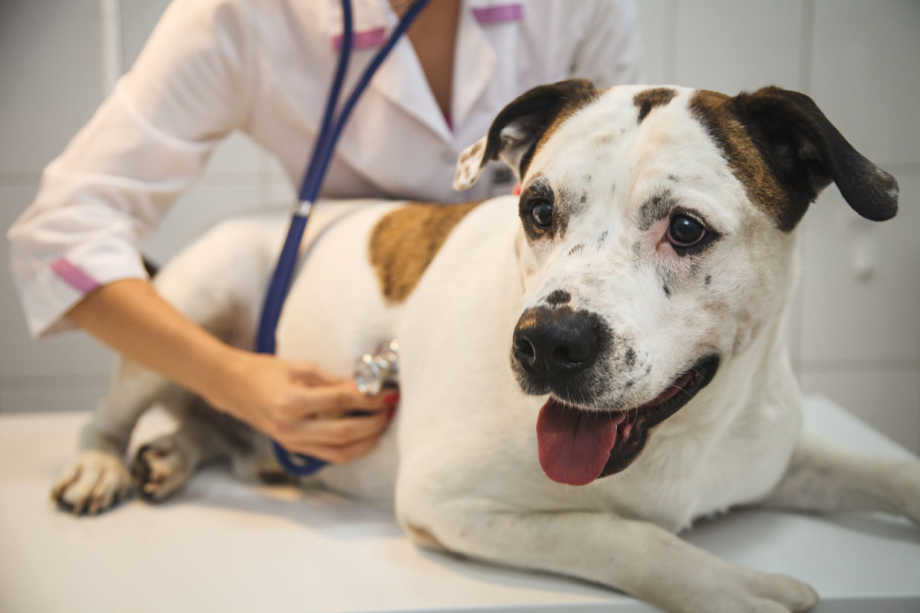Heart failure in pets is a potentially life-threatening condition. A malfunction of the heart or the pumping action of the heart causes the heart to pump too little blood.
This condition affects the function and efficiency of the heart and the pumping action of the blood in the body. It occurs more frequently in small breeds of dogs such as hunting dogs, wieners, spaniels and Labradors, as opposed to large breeds such as Great Danes, German Shepherds, Rottweilers, among others.
When a pet experiences heart failure, the body tries to compensate for the reduced blood flow. The heart begins to beat faster and with more effort. The heart muscles may thicken or the heart chambers may expand in an attempt to pump more blood.
To discover the most interesting aspects of this very common pathology in the above mentioned breeds, and the treatments usually recommended, keep reading today’s article.
Heart Failure in Dogs and Heart Dysfunction
Heart dysfunction can occur for a variety of reasons. The most common cause is congenital heart disease.
Congenital heart disease develops at birth and is usually genetic in nature. The heart defect in these dogs is called congenital heart failure.
Another reason for heart failure is an abnormal heart rhythm. For example, when a dog has cardiomyopathy, a muscle disease, it can cause abnormal heart rhythms.
If the condition worsens, the heart may become unable to compensate. The amount of blood expelled by the heart is no longer sufficient to supply oxygen to the tissues and meet the body’s needs.
Rheumatic Fever Heart Disease
Heart disease in dogs can also be the result of a condition called rheumatic fever. Rheumatic fever is caused by inflammation of the valves, arteries and tissues of the heart.
External diseases are another reason for heart failure in pets. Some common external diseases are flea bite allergy, heart valve disease and congenital defects in dogs.
Some dogs may have a defective gene that causes heart failure. Infections such as mumps, scabies and infections can also cause heart failure.
When Should It Be Treated Immediately?
Dogs with congenital heart defects need immediate medical attention. These dogs may not survive if they are not treated.
Heart failure is characterized by excessive pumping action of the heart with obstruction of blood flow. As a result, the amount of oxygen and nutrients carried to the heart decreases. Heart dysfunction leads to heart failure in dogs.
Most Common Symptoms of the Disease

The most common symptoms of heart failure in dogs are shortness of breath, urination, vomiting, and diarrhea and heart palpitations.
If a pet suffers from this condition, he or she usually faints, goes into cardiac arrest or dies. It is important to take your dog to the veterinarian immediately when you notice these symptoms.
Treatments for Heart Failure in Pets
Once the dog has been evaluated and diagnosed with this condition, the veterinarian must determine the most appropriate treatment for your pet. This treatment will depend on the specific pathology of the pet, and its goal is to mitigate the adverse effects.
There are other different treatments for heart failure in dogs. One of the most effective ways to treat this problem is with a heart transplant.
However, there is always a risk of complications during and after the operation. That’s why it’s important to carefully monitor your dog’s health, including heart problems.
Treatment with Medication and Diet
It is often necessary to administer medications that promote better pumping and heart activity. The evaluating veterinarian will advise additional recommendations for the dog’s well-being, which may include exercise restriction and additional treatment if your pet is overweight.
If you suspect your dog is suffering from pet heart failure, don’t delay in treating him. Heart problems affect thousands of dogs every year, and you want to make sure your dog survives this episode as long as possible.
Did you already go to the vet? What did he advise? Share his recommendations with us in the comments below.
